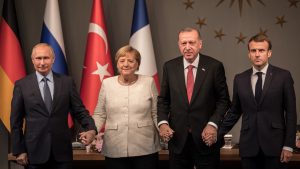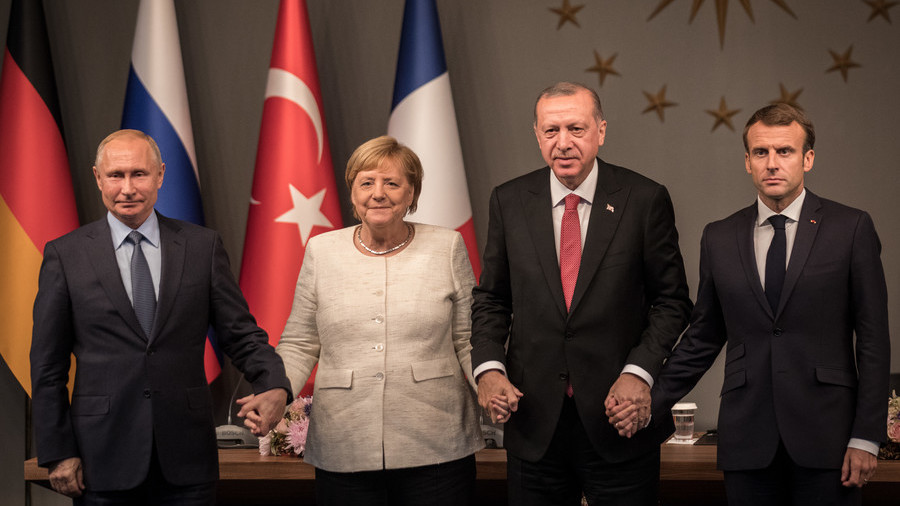Wow… the optics out of Saturday’s Syria summit in Istanbul. While it’s true there were no major breakthroughs or significant shifts in the Astana process in terms of winding down the seven-year long war to come out of the four-way meeting involving France, Germany, Russia, and host Turkey in Istanbul, the optics of “Europe going to Istanbul” — and without the United States — speaks volumes.

Image via Global Look Press
This comes after European countries and especially France for years calling for and at times directly assisting the West’s regime change efforts in Syria. And it’s more telling in terms of who is absent from the summit photo op. Germany and France are in effect “breaking the U.S. boycott of Syria” in the words of Syria analyst Joshua Landis.
Landis argues that looming large in the background is the would-be impact of a failed Russia-Turkey-Assad Idlib deal on Europe’s already busy shores: should Assad and Russia launch a major push into Idlib as was planned in early September, but subsequently halted, a new explosion of Syrian refugees as well as transplanted jihadis would hit Europe’s borders.
Here’s what Professor Joshua Landis of Syria Comment had to say, used with permission of the author:
“The real importance of France and Germany going to Turkey to meet Putin and Erdogan is that they are effectively hiving off from the US by joining the Astana process. They are breaking the boycott of Syria, while preserving the “need for elections” talking point.
We may safely conclude that Assad will not permit any “political process” or constitutional committee to dislodge him or bring members of the opposition to power in Damascus. He has won the war.
Europe is frightened for its security. It does not want the refugee situation nor the Jihadi situation in Europe to be made worse by an Idlib invasion. This is why Europe is in Istanbul. As Macron said, the Idlib deal must be sustained.
Russia has reiterated that the Idlib deal is temporary. The jihadists must be killed or arrested. But Russia wants the EU to engage and commit to reconstruction aid for Syria, which can help refugees return.
Europe is angry at the U.S. for unilaterally scuttling the Iran deal and possibly crushing the Iranian economy, which could further destabilize the region and lead to an even greater refugee flow toward Europe. The US policy is very bad for Europe.
Turkey, Syria, Iran and Russia want to drive the US out of North Syria and end its alliance with the YPG.
There are many competing agendas among the different sides in Istanbul, but this is an important step forward, breaking with America’s stated goal of boycotting Syria so long as Assad remains in power.
It is a logical step forward after many Gulf countries, such as Bahrain and Kuwait, took measures to recognize the present reality of the Assad victory and work toward the normalization of relations between their countries.”






























